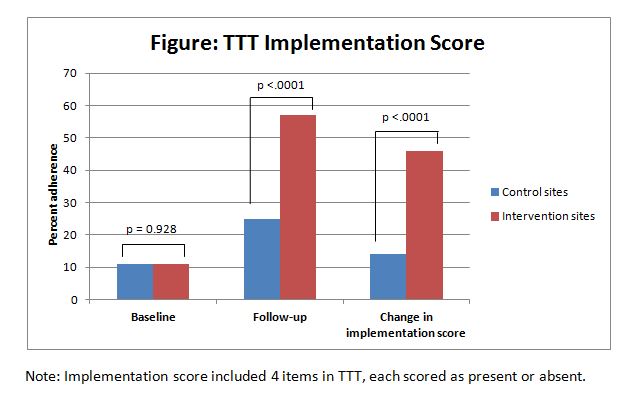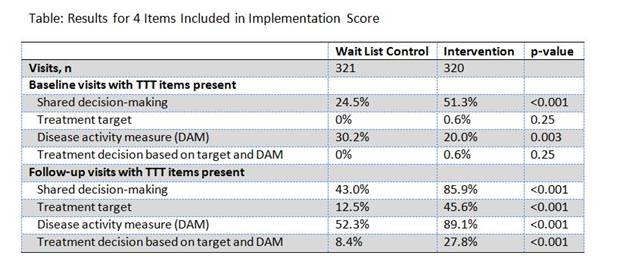Session Information
Date: Wednesday, November 16, 2016
Title: Rheumatoid Arthritis – Clinical Aspects VII: The Impact of Treating to Target
Session Type: ACR Concurrent Abstract Session
Session Time: 11:00AM-12:30PM
Background/Purpose: Treat to target (TTT) is a recommended strategy in the management of rheumatoid arthritis (RA), but various studies suggest that its uptake in routine US care is sub-optimal. We carried out a randomized controlled trial of a Learning Collaborative to facilitate implementation of TTT.
Methods: We recruited 11 rheumatology sites from the US and randomized them into 2 groups: 5 sites received the Learning Collaborative intervention over 9 months and the other 6 sites formed a wait-list control group. The Learning Collaborative used a description of the problem with strategies for improvement (Model for Improvement with Change Package) and action phases. The intervention included: 1 face to face meeting and 8 learning sessions via webinar; use of a web-based tool for sharing results of plan-do-study-act cycles; and collection by sites of their monthly improvement measures assessing progress. The primary outcome was the between group difference in the change in TTT implementation, as measured in medical records by study staff at baseline and follow-up. TTT implementation was scored using 4 items: shared-decision making, choice of a target, use of a disease activity measure (DAM), and changing treatments based on the target and DAM. The TTT implementation was scored on a 0-100% scale based on the presence/absence of the 4 items. The between group difference was measured at the patient-level, accounting for the clustering in a linear mixed model.
Results: 23 providers participated at the five intervention sites and 23 at the six control sites. The chart review included 320 RA patients from intervention and 321 from control. The patient groups were well matched, with a mean age of 60 years, 78% were female, 64% were seropositive, and treatments were similar at the start of follow-up. At baseline, mean TTT implementation score was 11% in both groups (p = 0.93) (see Figure). At follow-up, TTT implementation score in the intervention arm was 46% (SD 36%) compared with 14% (SD 28%) in the control arm (p < 0.0001) (see Figure). Improvements were observed for all four items in the implementation score (see Table). No negative consequences from the intervention were observed, with similar use of laboratory testing and x-rays, as well as similar rates of adverse events in the intervention and control arms.
Conclusion: A Learning Collaborative was an effective intervention to improve implementation of TTT for RA. Future steps will focus on analyzing the sustainability of change.
To cite this abstract in AMA style:
Solomon DH, Lu B, Losina E, Agosti J, Zak A, Corrigan C, Yu Z, Lee S, Bitton A, Harrold L, Pincus T, Radner H, Smolen J, Fraenkel L, Katz JN. Implementation of Treat to Target in Rheumatoid Arthritis through a Learning Collaborative [abstract]. Arthritis Rheumatol. 2016; 68 (suppl 10). https://acrabstracts.org/abstract/implementation-of-treat-to-target-in-rheumatoid-arthritis-through-a-learning-collaborative/. Accessed .« Back to 2016 ACR/ARHP Annual Meeting
ACR Meeting Abstracts - https://acrabstracts.org/abstract/implementation-of-treat-to-target-in-rheumatoid-arthritis-through-a-learning-collaborative/


